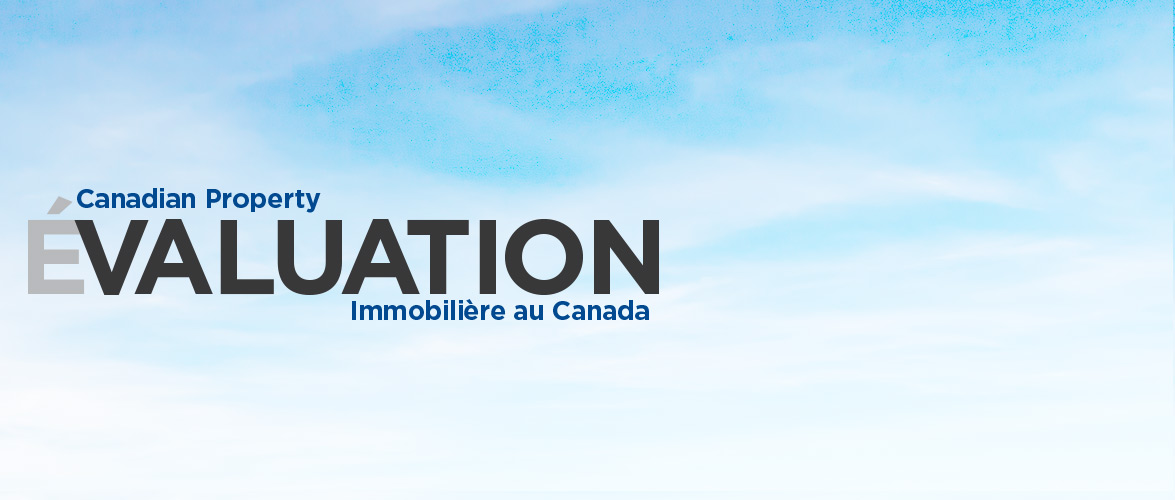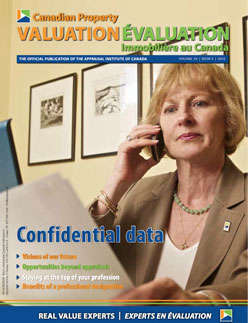Updates on Being an Expert Witness (Part I, II)
Canadian Property Valuation Magazine
Search the Library Online
Part I
By Mark R. Frederick, LL.B., Miller Thomson LLP (with assistance by Denis Rivard of Central Claims Management)
“An expert is one who knows more and more about less and less.”
– Nicholas Murray Butler
Appraisers as experts
By nature, appraisers are experts on a number of topics. Every appraisal then is an expert report. Many appraisers make a decent living on providing evidence in Canadian courts. Recently, Ontario has changed its Rules of Civil Procedure to provide for the more complicated and particular role of experts in litigation matters. Appraisers should be aware of what the new rules provide, as their testimony will be governed by them. While this article largely pertains to the law of Ontario and experts, it has relevance in the other common law provinces of Canada as well as in Quebec, as the law sets out basic standards that should be employed by appraisers in their work.
Ontario Rules
New Rules pertaining to civil procedure and experts came into effect in Ontario on January 1, 2010.
Rule 4 provides:
4.1.01 (1) It is the duty of every expert engaged by or on behalf of a party to provide evidence in relation to a proceeding under these rules,
(a) to provide opinion evidence that is fair, objective and non-partisan;
(b) to provide opinion evidence that is related only to matters that are within the expert’s area of expertise; and
(c) to provide such additional assistance as the court may reasonably require to determine a matter in issue.
(2) The duty in subrule (1) prevails over any obligation owed by the expert to the party by whom or on whose behalf he or she is engaged.
The minimum content of a report is provided by Rule 53:
53.03(2.1) A report provided for the purposes of subrule (1) or (2) shall contain the following information:
1. The expert’s name, address and area of expertise.
2. The expert’s qualifications and employment and educational experiences in his or her area of expertise.
3. The instructions provided to the expert in relation to the proceeding.
4. The expert’s opinion respecting each issue and, where there is a range of opinions given, a summary of the range and the reasons for the expert’s own opinion within that range.
5. The nature of the opinion being sought and each issue in the proceeding to which the opinion relates.
6. The expert’s reasons for his or her opinion, including,
1. a description of the factual assumptions on which the opinion is based,
2. a description of any research conducted by the expert that led him or her to form the opinion, and
3. a list of every document, if any, relied on by the expert in forming the opinion.
7. An acknowledgement of expert’s duty (Form 53) signed by the expert.
An expert is restricted as to what he or she can testify to under Rule 53 which provides:
(3) An expert witness may not testify with respect to an issue, except with leave of the trial judge, unless the substance of his or her testimony with respect to that issue is set out in,
(a) a report served under this rule; or
(b) a supplementary report served on every other party to the action not less than 30 days before the commencement of the trial.
Judges’ impressions and impressing the judge – the function of the expert
“I am not aware that the expert is an expert in logic, and I do not understand that the expert has a corner on the market of what conclusions are logical and which are not.”
– Justice Osborn
“The function of the expert witness is to provide for the judges, and sometimes the jury,
– an opinion as to the significance of, or the inference which may be drawn from,
– proved facts,
– in a field in which the expert possesses special knowledge and experience,
– going beyond that of the trier of fact.”
(M. F. Harrington ‘Expert Witnesses: The Good, The Bad and The Ugly’ (Canadian College of Construction Lawyers 6th Annual Conference: May 29, 2003))
The Supreme Court of Canada has provided that courts should only allow an expert to provide opinion evidence where the evidence is advanced with respect to matters that are beyond the common understanding of the judge or jury.
“An expert’s function is precisely this: to provide the judge and jury with a ready-made inference which the judge and jury, due to the technical nature of the facts, are unable to formulate” …
The expert should be “a neutral observer who guides judges and juries through complicated evidence so that they can draw their own conclusions about the issues at hand.” (Justice Dickson in R. v. Abbey)
Part II
By Mark R. Frederick, LL.B., Miller Thomson LLP
(with assistance by Denis Rivard of Centra Claims Management)
“If an expert says it cannot be done, get another expert.”
– David Ben-Gurion
Questions the appraiser should ask after being retained
• What is the question I am being asked to answer?
• What facts are available to me?
• What are the assumptions I should make in arriving at an answer?
If you cannot answer these questions with any satisfaction, you should decline the assignment, as you will not be able to deliver a proper report.
What is expected from the expert (e.g., in assessment and quantification of a claim)?
• Give evidence of the proper method to be adopted in assessing a claim and exceptions to that method.
• Give evidence of industry practice.
• Give opinions on cause and effect.
• Give factual evidence about construction techniques and practices.
• Give technical reasons why his or her opinion should be preferred over other experts.
What is NOT acceptable
• Making conclusive findings of fact on disputed issues.
• Assessing the value of the plaintiff’s claim.
• Assigning blame.
• Giving a legal interpretation of contractual requirements.
Being qualified
Qualification of an expert is a process whereby the court and opposing counsel get to test your qualification to be an expert. This is often an interesting part of the trial, as it is an opportunity for counsel to have you dismissed because of bias or errors in your report.
To be qualified, an expert must be forthcoming about his or her qualifications:
• Clearly state your education and/or experience.
• Advise when an issue falls outside your realm of expertise.
• If facts or instructions provided to you concerning your opinion are incomplete or research is based on insufficient data, then state your opinion as being provisional.
Court criticisms of expert opinions
The Court is not hesitant to conclude that an expert opinion is unsound. This harms the overall credibility of an expert in his own case and in others. Some recent criticisms included:
• opinion expressed as to proper interpretation of contract in issue,
• the use of too many drawn inferences instead of actual facts to support opinions,
• positions that were more argument than evidence, and
• straying from the purely scientific to provide comment on matters in the case at large.
Bias and expert role
A report that is biased is useless to the Court and to clients. To avoid this prospect, an expert must:
• maintain a degree of objectivity and impartiality with respect to the evidence that he or she is presenting,
• not provide unconditional support for counsel’s position,
• display objectivity,
• advise counsel of both the strengths and weaknesses in his or her case,
• not come across as defensive or argumentative, and
• not be an advocate for his or her client.
How to avoid bias
Some pointers on avoiding bias in your opinions:
• State the facts or assumptions on which your opinion is based.
• Do not fail to consider material facts that detract from the concluded opinion.
• After exchange of reports, if you change your view on a material matter, let the other side know.
• When referring to photographs, plans, calculations, survey reports or other similar documents, they must be provided to the other side.
Expert sanctions
Possible sanctions for an expert who fails to adhere to his role include:
• evidence will be given little or no weight,
• reputation as a ‘hired gun’/loss of credibility,
• complaint to professional body, and
• costs award against non-parties.
Open season on your work product
The old rule in Ontario was that your work product had some privileges. This is no longer the case. What about your notes, memos, earlier drafts, etc.?
• The opposing side can request production of preparatory materials.
• These include facts on which that opinion is based, and the instructions given to the expert by counsel, as well as the information which forms the basis of the expert’s opinion, findings, and conclusions.
• Memoranda prepared by counsel and communications between counsel and expert are protected by litigation privilege, but information contained within these documents may be discoverable if it formed part of the expert’s final opinion.
Multiple experts
In complex claims, counsel may elect to have two experts:
• one to assist ‘behind the scenes’ with litigation strategy, including claim preparation, negotiation and mediation; and
• another to prepare the opinion and testify at trial.
Summary
Briefly summarized, the new rules pertaining to expert witnesses provide:
• overriding duty to the court,
The Court can force experts to meet together and narrow issues in dispute
• joint statement by experts,
• earlier deadlines for service, and
• more information and substance required in report.
Parting quote
“Expert: a man who makes three correct guesses consecutively.”
– Dr. Laurence J. Peter





